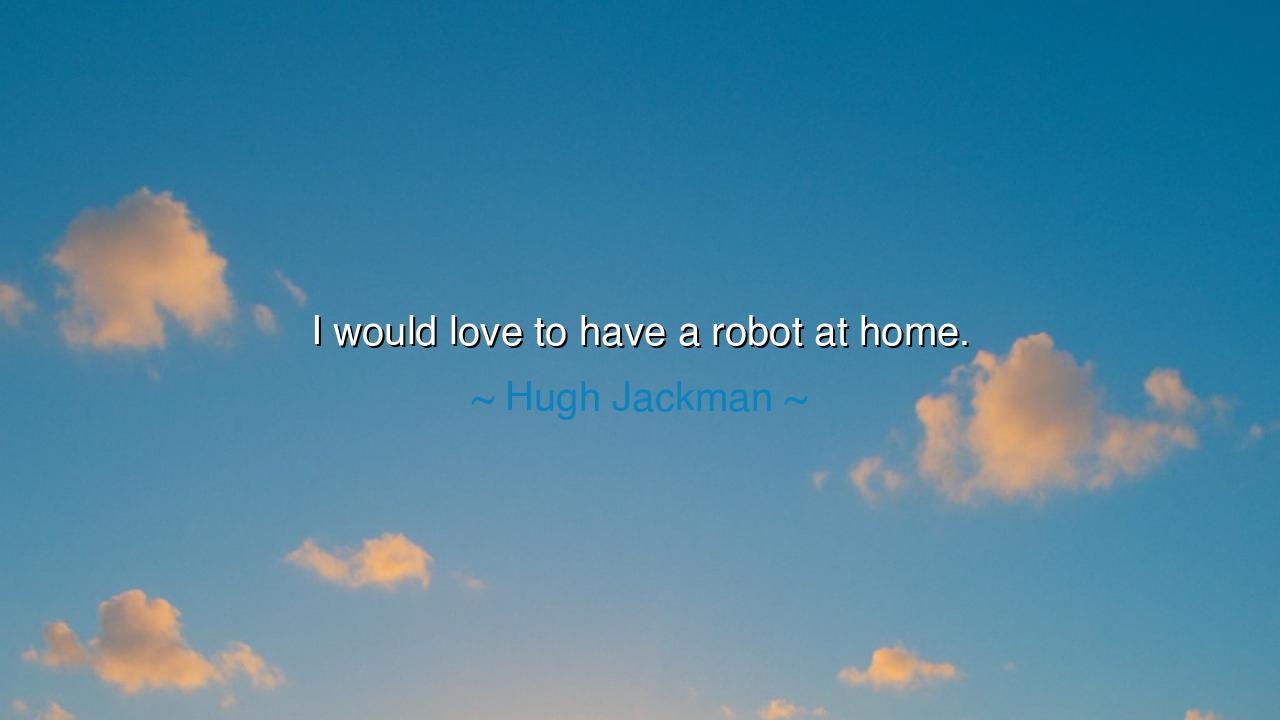
I would love to have a robot at home.






In the playful, future-leaning wish of Hugh Jackman—“I would love to have a robot at home”—we hear more than a celebrity’s convenience; we hear humanity’s old dream, the yearning to be companioned by tools so faithful they feel like kin. The sentence is short, but it opens like a gate onto myth and workshop alike. It is a confession of modern hope spoken in the accent of the ancients: let the burdened day be lightened by an obedient helper; let craft become care; let the house be a little wiser than we are tired.
The elders would nod, for the desire is ancient. In Homer’s telling, the smith-god Hephaestus set tireless robots—golden handmaids—about his forge, moving with intelligence and grace. In the halls of Crete, the bronze sentinel Talos circled the island like a beating clock. Later, Hero of Alexandria built whistling temples and self-opening doors, early proofs that mechanism could mimic miracle. To say, “a robot at home,” is to join that lineage: from divine automatons to hidden pulleys, from clockwork birds to microchips humming quietly beside the kettle.
Yet the wish is not only for spectacle; it is for mercy. A true home is a sanctuary of restored strength, and many of us come to its threshold with hands emptied by labor. The longing for a robot is the longing for time—to read to a child, to tend a garden, to sit without apology. If a faithful mechanism can carry the broom, sort the linen, or remind a weary mind of medicine and rest, then the machine becomes an ally of tenderness. The ancients would say: the best tool is the one that returns you to the human.
History teaches how each domestic invention has quietly enlarged the soul’s day. The humble washing machine freed hours for learning; the thermostat tamed the seasons so the family could gather without shivering; the vacuum erased the tyranny of grit. In this procession, a robot is not a threat to humanity but the next steward of drudgery. Consider a modern parable: an elder, living alone, receives a small mobile aide that fetches water, calls for help, and reads messages. Dignity, once at risk, is restored. The house becomes friendly again; the elder’s laughter returns to the table.
But desire must be disciplined by wisdom. The ancients warned that Prometheus’s fire both warms and burns. A robot at home must not become an idol that replaces attention, nor a spy that sells the quiet of the living room to distant markets. Tools ask for training, boundaries, and a keeper’s heart. We must choose what the machine will do—and what only love should do. Let silicon sweep; let human hands still hold, forgive, and bless.
Therefore let a lesson be carried from this simple wish. Welcome the helpful future, but enthrone it in service of the human present. Practical counsels: (1) When adopting any “robot,” name the human goods it will protect—time together, rest, safety—and measure its worth by those fruits. (2) Keep a “no-automation” list—bedtime stories, shared meals, neighborly visits—acts reserved for persons. (3) Guard the thresholds of privacy; choose devices that keep your home’s secrets as faithfully as a friend. (4) Use saved minutes as offerings, not profits—trade them for attention, creativity, and care.
At last, hear the deeper meaning in Hugh Jackman’s light remark: the best technology is hospitality in metal and code. If we bid a robot into our home, let it come as a servant of compassion, not a substitute for it. Then the house will grow more human, not less; the day will breathe wider; and we will find that the oldest hope—tools that make room for love—has become, at last, a daily practice.






AAdministratorAdministrator
Welcome, honored guests. Please leave a comment, we will respond soon